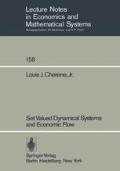Abstract
The adaptive theory of economic activities is of interest because of its ability to portray behavior realistically. In the recursive programming framework the assumption of utility maximization is maintained while perfect knowledge and perfect competition are replaced with learning mechanisms and inaccurate forecasts of technical feasibility. These considerations of “positive” economics generate a dynamical system whose properties may be investigated using simulation or mathematical analysis. One question of interest is whether recursively programmed time paths converge to those that would result from perfect knowledge-perfect rationality-perfect competition models. Convergence of these two trajectories would bestow upon the adaptive model asymptotically normative properties of its orthodox, rational counterpart. The examples portrayed in the previous chapters were shown to possess asymptotically stable attractors having the normative properties of dynamic or static optima. The planning procedure converges to an optimal dynamic program if certain conditions upon the parameters exist. The Edgeworth process approaches a static Pareto optimum when barter and price mechanisms behave properly. In both cases, a sequence of suboptimal actions, motivated by incomplete or erroneous perceptions of the environment, approach the solution of a static mathematical or dynamic programming problem based on the true values of the environmental parameters.
Access this chapter
Tax calculation will be finalised at checkout
Purchases are for personal use only
Preview
Unable to display preview. Download preview PDF.
Author information
Authors and Affiliations
Rights and permissions
Copyright information
© 1978 Springer-Verlag Berlin Heidelberg
About this chapter
Cite this chapter
Cherene, L.J. (1978). The Structure of Optimality in Dynamic Models. In: Set Valued Dynamical Systems and Economic Flow. Lecture Notes in Economics and Mathematical Systems, vol 158. Springer, Berlin, Heidelberg. https://doi.org/10.1007/978-3-642-45504-9_6
Download citation
DOI: https://doi.org/10.1007/978-3-642-45504-9_6
Publisher Name: Springer, Berlin, Heidelberg
Print ISBN: 978-3-540-08847-9
Online ISBN: 978-3-642-45504-9
eBook Packages: Springer Book Archive

